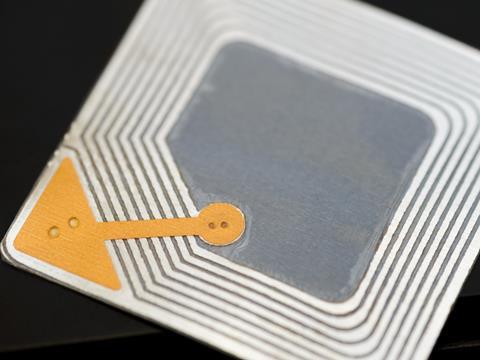
Tageos has announced an expansion to its EOS Zero Max product line, which it says are “highly sustainable” RFID inlays made with an FSC-certified paper substrate and 4E technology.
The new inlays will include EOS-300 Zero Max, EOS-430 Zero Max, and EOS-241 Zero Max, which the company says are based on the latest generation of ICs from Impinj and NXP. Tageos adds that the new inlays are intended to complement the existing EOS Zero Base, Zero Max, and Zero Plus product lines of sustainable RFID inlays.
The Zero Base range is made using a vacuum deposit method to create super-thin aluminium antennas, apparently with minimal use of materials on a biodegradable FSC certified paper substrate. This results in a flexible structure that is reportedly suitable for applications that combine sustainability with less challenging environments and intended usage times.
Meanwhile, the EOS Zero Max range features antennas made by precision laser-cutting 4E technology, which is supplied by Tageos’ partner All4Labels. According to the company, these antennas enable FSC certified, paper-based RFID inlays that are apparently plastic-free, heavy metal-free, and conflict-material free.
Tageos claims that the EOS Zero Max range is therefore “highly efficient” with up to 70% less waste and a 90% smaller carbon footprint than PET-based products.
Finally, the EOS Zero Plus RFID inlays and tags can offer higher robustness and longevity for retail, logistics, and industrial manufacturing applications, according to Tageos. Like the Zero Max range, Tageos says that Zero Plus inlays do not contain plastic, heavy metal, or conflict materials.
Chris Reese, director of product management at Tageos, comments: “With our new EOS Zero Max product line, currently embodied by EOS-300, EOS-430 and EOS-241, we are not simply starting to round off what is already the industry’s most comprehensive portfolio of sustainable RFID inlays.
“We are also sending a loud and clear message to the market: That we have understood the sustainability needs of our customers and markets, and that we are and will continue to be the market leader in highly sustainable RFID inlays and tags to fully support our customers’ demands.”
The new EOS-300 Zero Max and EOS-403 Zero Max have allegedly passed that same ARC specifications as PET substrate-based alternatives and are available in bulk quantities.
RFID technology is a security feature that offers traceability across supply chains for various sectors, especially for highly sensitive segments like pharmaceuticals. Other innovations that combine the demand for this technology with sustainability include Avery Dennison’s atma.io connected cloud that can track, store, and manage data on individual products and ISBC and Sappi’s smart paper with embedded RFID chips.
















